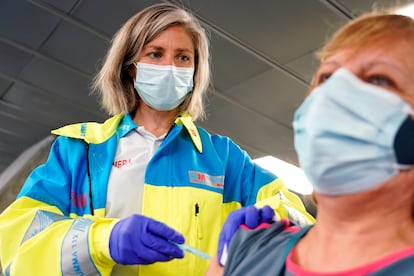Despite pressure from regions, Spain’s Health Ministry delays decision on second AstraZeneca shots
The government is opting to wait for a clinical trial on the risks for the under-60s of the medication, with options on the table such as administering a different vaccine or skipping dose two altogether

The Andalusia and Madrid regions, both of which are governed by the conservative Popular Party (PP), voiced their complaints on Wednesday at a meeting with other regional chiefs and the central Health Ministry about the delay on a decision as to whether a second dose of the Oxford-AstraZeneca vaccine should be administered to the under-60s. Officials from both regions called on the ministry to “find a quick solution to this problem,” according to sources with knowledge of the meeting of the Inter-Territorial Council of the National Health System (CISNS).
Earlier this year, essential personnel under the age of 60 – such as teachers, police officers and prison guards, among others – were given their first dose of AstraZeneca. However, its use among younger sections of the population was put on hold by Spain after the vaccine was shown to be associated with very rare cases of blood clots. Since then, the Health Ministry has been due to make a decision about whether this group should get their second shot of the same medication, should get a different vaccine such as the Pfizer-BioNTech or should not get another dose at all.
Early results from a recent UK study show an increase in adverse reactions when two different vaccines are combined. Researchers found up to three times as many cases of fever, fatigue and muscle and joint pain among people who had received a combination of AstraZeneca and Pfizer-BioNTech vaccines, compared with those who received two shots of the same one. The ongoing study has not found more serious side effects.
The health department is considering ways of ensuring that no dose is wasted, and that voluntary administration is an option for the 140,000 people who have received the first shotMadrid premier Isabel Díaz Ayuso
The regional premier of Madrid, Isabel Díaz Ayuso, threatened on Wednesday morning to start using AstraZeneca for these second shots with or without the blessing of the central Health Ministry, a position that was backed by Andalusia. Díaz Ayuso has long been at loggerheads with the central administration – a coalition of the Socialist Party (PSOE) and leftist Unidas Podemos – over its handling of the pandemic, and just last week she swept to reelection at a regional poll thanks to her position on issues such as the lax coronavirus restrictions that have been enforced in Madrid during recent months.
“The health department is considering ways of ensuring that no dose is wasted, and that voluntary administration is an option for the 140,000 people who have received the first shot,” said the regional premier during her first news conference following her election victory on May 4. Díaz Ayuso noted that if the central government does not make a decision soon, “in the next days and weeks [the doses] will have to be applied so the effect of the first one is not lost.”
Despite this pressure, plus the fact that the 12-week period recommended between AstraZeneca shots has now started to expire for the first people who received the vaccine, the ministry is insisting on waiting another week until the first results arrive from a clinical trial being carried out by the Carlos III Health Institute in Madrid. The final decision, Health Minister Carolina Darias insisted, would be taken by the Public Health Commission.
A spokesperson from the Carlos III Health Institute has confirmed that the “preliminary results” of the trials will be available next week. The study, meanwhile, will continue for several months, but the early information along with research carried out in other countries will help the ministry to take a decision.
Yesterday it emerged that three Canadian provinces and Norway have also decided to stop using AstraZeneca, in the former’s case due to an increase in blood clot cases. The Canadian authorities estimate that the risk is one case in 60,000 doses administered rather than one in 100,000, the Efe news agency reported. Norway, what’s more, has also suspended the use of the Janssen vaccine, which has been connected with similar cases of clots and the use of which has just been approved in Spain for the under-60s.
“Beating the virus”
Speaking after the meeting yesterday, Health Minister Darias insisted that Spain would be sticking to its current strategy. “The contexts are different in each country and the decisions must be made according to their needs,” she said, in reference to the different options taken by European governments and the fact that Spain is not currently following the recommendations of the European Medicines Agency to administer the second AstraZeneca dose.
Darias also expressed optimism about the progress of the epidemic in Spain, while at the same time calling for caution. “We are beating the virus,” she stated. “The cumulative incidence, of 173 cases per 100,000 inhabitants over 14 days, confirms this ongoing fall, of nearly 2.2% a day. We are on the right path, but we have to continue to persevere with the measures that we know to be efficient.”
She was even more optimistic about the vaccination campaign and its current speed. “More than 30% of the population has now received one dose,” she continued. “Vaccination is the best news we have to keep the virus in check and to start the economic recovery,” she concluded.
With additional reporting by Miguel Ángel Criado and Juan José Mateo.
English version by Simon Hunter.
Tu suscripción se está usando en otro dispositivo
¿Quieres añadir otro usuario a tu suscripción?
Si continúas leyendo en este dispositivo, no se podrá leer en el otro.
FlechaTu suscripción se está usando en otro dispositivo y solo puedes acceder a EL PAÍS desde un dispositivo a la vez.
Si quieres compartir tu cuenta, cambia tu suscripción a la modalidad Premium, así podrás añadir otro usuario. Cada uno accederá con su propia cuenta de email, lo que os permitirá personalizar vuestra experiencia en EL PAÍS.
¿Tienes una suscripción de empresa? Accede aquí para contratar más cuentas.
En el caso de no saber quién está usando tu cuenta, te recomendamos cambiar tu contraseña aquí.
Si decides continuar compartiendo tu cuenta, este mensaje se mostrará en tu dispositivo y en el de la otra persona que está usando tu cuenta de forma indefinida, afectando a tu experiencia de lectura. Puedes consultar aquí los términos y condiciones de la suscripción digital.









































